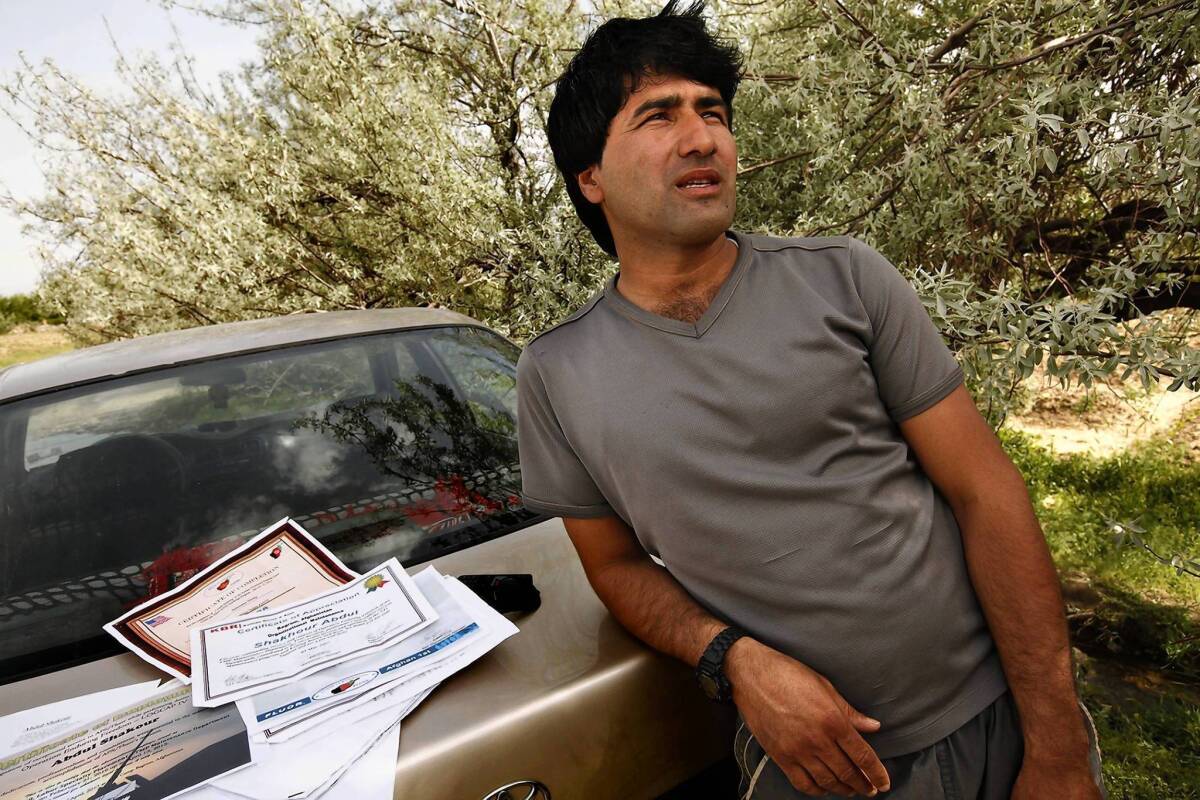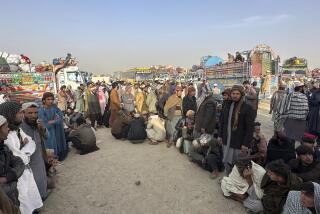Afghans on U.S. bases losing jobs after years of devoted service

CHARIKAR, Afghanistan — Abdul Shakour was working the night shift at Bagram air base repairing American vehicles when he was called to an emergency meeting.
The news was bad: Shakour and 22 other Afghan mechanics were being laid off. After seven years at Bagram, Shakour was unceremoniously shown the door last month. He was told to return the next day to turn in his security badge and collect his final paycheck.
“There aren’t as many vehicles to fix and not as many soldiers around, so they don’t need us anymore,” Shakour said outside the base, speaking with a thick accent the English he had learned from American civilians and troops.
The 11-year Western military occupation of Afghanistan has been a boon for the Afghan workforce, providing thousands of jobs for interpreters, mechanics, cleaners and drivers. But with bases being torn down and equipment shipped out as combat troops prepare to leave next year, many Afghan workers are no longer needed.
For Shakour and his close friend Padshah Gul, a mechanic who was laid off the same day, the consequences are devastating. Their Bagram jobs paid far more than typical semiskilled Afghans earn. The pair assumed that working for foreigners afforded more certainty and stability than the shaky Afghan economy could provide. Now that seemingly solid foundation has been torn away, leaving them feeling bereft and abandoned.
“I worked hard. I never made mistakes. I never missed work. I’m a very good mechanic; I can fix anything. So how can they send me away just like that?” Shakour asked. He clutched a folder stuffed with certificates from his American supervisors citing his superior job performance.
U.S. military officials referred layoff questions to private contracting firms, which hire most Afghans working on bases. The mechanics worked for Fluor, an engineering and construction company based in Irving, Texas. The firm did not respond to requests for comment.
The mechanics said Fluor supervisors told them the contract under which they were hired had ended. Afghan workers at military bases have been laid off periodically for years, but the pace has quickened this year as U.S. and coalition troops pull out.
Shakour, 28, a solidly built, gregarious man, says his $1,300-a-month salary has supported an extended family of 12, including his wife and 2-year-old son. Over the years, he had worked his way up from laborer trainee to mechanic supervisor.
Gul, 40, a slender man with a long, solemn face, has cared for 13 relatives, including his wife and six children, on his $900-a-month salary. He had toiled at Bagram since 2008, working his way up to a job in which he trained mechanics to repair civilian vehicles used by American troops.
“This hit me very hard. Times are difficult now, so it’s very upsetting,” Gul said, sitting dejectedly in his whitewashed farmhouse in Jabal os Saraj, a bustling market town about 20 miles from the Bagram base.
He said he was given no warning of the layoff and no severance pay. “Even the lowest government workers in Afghanistan get severance when they leave their jobs,” he said.
Charikar, Jabal os Saraj and other towns in Parwan province have enjoyed a modest economic boom in the last decade, thanks to job opportunities at the massive Bagram base. About 25 miles north of Kabul, it is one of the two largest coalition air bases in Afghanistan, along with Kandahar Airfield.
“I think we have become too dependent on Bagram,” said Ahmad Shah Khan, 46, another mechanic who was laid off the same day after seven years at Bagram. “Now everybody is depressed and wondering what will happen next.”
Bagram has pumped up the local economy on and off for years, beginning when the Soviet military occupied the base in the 1980s. Now, layoffs are affecting thousands of extended families — “a huge problem the people are facing now,” said Roshna Khalid, spokeswoman for Parwan’s governor.
Some laid-off younger men drift into opium or heroin addiction, she said, and others leave the country in search of work. “As more people are losing jobs, that adds to violence and insecurity in the country as a whole,” Khalid said.
Citing security concerns, a U.S. military spokesman declined to say how many U.S. troops or Afghan workers remain at Bagram. A colonel there said the base is home to 38,000 people: U.S. and coalition troops, plus thousands of Afghan and foreign workers.
In addition to the economic blow, laid-off mechanics face possible retaliation from insurgents for having aided the Americans. Afghan workers at coalition bases routinely receive Taliban death threats, often in the form of so-called night letters left at their homes. Scores of Afghan workers, especially interpreters working with U.S. troops, have been killed by insurgents.
The three mechanics say they have not been directly threatened but worry that they and their families are at an elevated risk as U.S. troops depart. “Everyone knows I worked for the Americans. How can I hide something like that?” Gul said.
Shakour said he fears that the Taliban will grow bolder as more troops leave. “It’s a big problem, of course,” he said. “I would love to move my whole family to another country.”
The U.S. offers a Special Immigrant Visa program for Afghans who can prove they provided “faithful and valuable service to the U.S. government,” according to the State Department. But under a 2009 law, such visas are limited to 1,500 a year. Applicants must meet strict requirements, including documentation of a serious threat against them because of their service to the U.S. government.
A separate special visa program has been created for Afghan interpreters who have worked for U.S. troops. Hasibullah Qaimy, 24, has already applied. After 18 months interpreting for U.S. troops, he has been told he will lose his $800-a-month job in two months because the unit he serves is leaving.
“ ‘Downsizing’ is what they called it,” Qaimy said in lightly accented English. He was put on a list of interpreters to be considered for jobs with other U.S. units. But he holds out little hope for such a job because so many other interpreters have been told that they also will be laid off as the units they serve leave Afghanistan.
Qaimy says he hopes to use his finance degree to find work with an Afghan business or use his English skills to interpret for an international aid group. “But will I ever find a job that pays so much as this one? I don’t think so,” he said as he took a break from interpreting for a U.S. Army platoon.
Shakour, the mechanic, says he’s proud of his service to the United States. “You have proven to be a great asset to our mission here in Afghanistan,” an American supervisor wrote in a certificate that cited Shakour’s “professionalism, dedication and outstanding performance.”
Another supervisor wrote, “Your hard work and professionalism will never be forgotten.”
Despite their jobs suddenly being taken away, many workers cherish these boilerplate certificates. They say they believed for years that the documents insulated them from the sort of calamity that hit them last month.
They say they knew U.S. forces were returning home, but assumed their jobs were safe through 2014 because of their certificates of lavish praise. Shakour, for instance, was a foreman, and was shocked that he was sacked along with the mechanics he supervised.
“I heard rumors about layoffs, but I never thought it would happen to me,” he said.
He was close to several American civilian contractors he worked with, he said, sharing tea and jokes with them. “They came and told me how sorry they were that I lost my job,” he said. Their own jobs could soon be eliminated as more U.S. troops leave.
The three Afghan mechanics are searching desperately for work. But the nation’s beleaguered economy will only shrink as the money and jobs brought by foreign troops, aid programs and nongovernmental groups decline.
Gul said, with faint hope in his voice, that his brother is still employed at Bagram as a mechanic.
Is he worried?
Gul lowered his head and grimaced. “Of course he is,” he said. “The Americans are leaving. Soon all the jobs will be gone.”
Special correspondent Hashmat Baktash contributed to this report.
More to Read
Start your day right
Sign up for Essential California for news, features and recommendations from the L.A. Times and beyond in your inbox six days a week.
You may occasionally receive promotional content from the Los Angeles Times.







